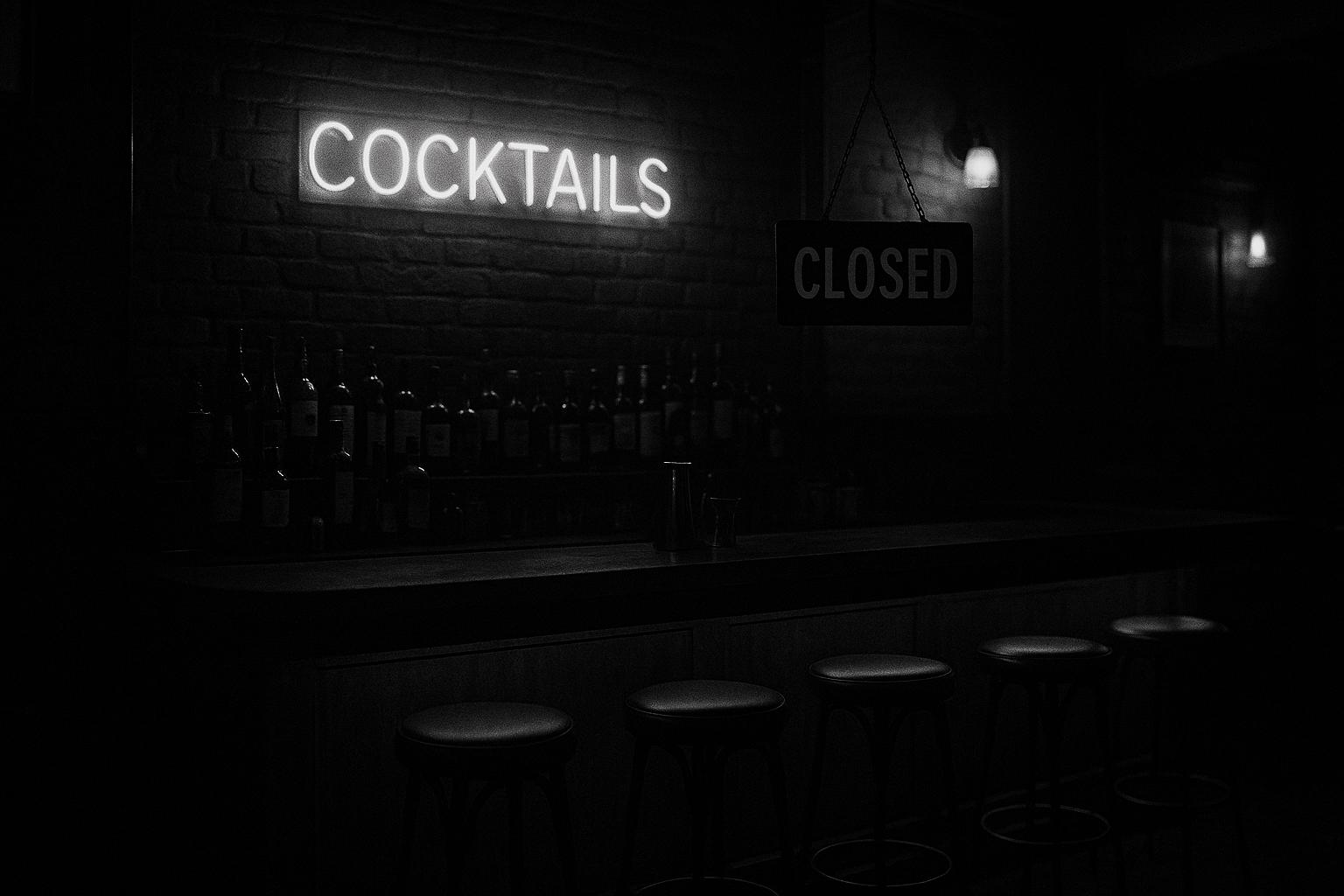Simmons cocktail bars plunge into administration following a £750,000 loss in 2024, as the struggling hospitality sector faces an accelerating wave of venue closures driven by rising costs and stagnant consumer spending.
London cocktail bar chain Simmons has entered administration after posting a significant loss of nearly £750,000 in the year ending March 2024. The decision to appoint London-based advisory firm Kroll to oversee the administration process comes amid efforts to restructure the business following financial difficulties. Simmons, known for its distinctive pink neon lighting and retro-style interiors, revealed this week that it would be closing at least four of its 21 sites, nearly all of which are located in London. Founder Nick Campbell characterised the closures as part of a strategic effort to streamline operations and focus resources on the chain’s most profitable venues. He also indicated that the company had secured additional investment aimed at supporting future expansion and operational improvements.
Simmons’ recent losses mark a stark reversal from the previous year’s near £2 million profit, underscoring the tough market conditions facing many hospitality businesses. The cocktail bar’s troubles mirror a broader trend of contraction within the UK hospitality sector, notable for a surge in venue closures over recent years. Industry data reveals that the sector is now 14.2% smaller than at the outset of the COVID-19 pandemic in March 2020, with a net loss of more than 16,000 venues during this period. Over 6,000 hospitality venues closed across the UK in 2023 alone, as rising costs and squeezed consumer spending placed unprecedented pressure on businesses.
Analysts and industry leaders have highlighted a combination of factors driving these closures. Increasing business expenses such as higher National Insurance contributions for employers, inflated business rates, and wage inflation have significantly raised the cost of operating hospitality venues. Kate Nicholls, chair of UKHospitality, told City AM that many London businesses were now operating at or below break-even levels as post-pandemic footfall and visitor numbers have yet to recover. She warned that while costs continue to escalate, revenues remain stagnant, meaning many businesses are effectively being “taxed out.”
The overarching cost-of-doing-business crisis is linked closely to government tax policies and sector-specific cost pressures, which have contributed to a steady decline in venues. Between October and December 2024, the UK experienced an average of eight hospitality site closures per day, pointing towards a continued contraction. In the first half of 2025, this rate accelerated further to two permanent venue closures daily, reversing some of the relative stability observed in 2024. Smaller hospitality businesses, often lacking the scale and buying power of larger groups, are particularly vulnerable in this environment.
Simmons joins a growing list of hospitality chains grappling with these challenges, such as craft beer maker BrewDog, which recently announced plans to close ten of its bars. The closures and restructurings underscore the seismic pressures reshaping the hospitality landscape — pressures characterised by rising operating costs, changing consumer habits, and ongoing economic uncertainty.
In this climate, Simmons’ strategic focus on consolidating its strongest venues while seeking new investment may be aimed at weathering the storm of industry-wide contraction. However, the broader picture remains difficult. Unless there is meaningful support from government or a rebound in consumer spending, the trend of closures and financial distress within the hospitality sector looks set to continue, with profound implications for local high streets and community vitality.
 Reference Map:
Reference Map:
- Paragraph 1 – [1], [2]
- Paragraph 2 – [1], [4], [2]
- Paragraph 3 – [1], [5], [6]
- Paragraph 4 – [1], [3], [7], [6], [5]
Source: Noah Wire Services
- https://www.dailymail.co.uk/news/article-14976463/cocktail-bar-chain-London-plunges-administration-losses.html?ns_mchannel=rss&ns_campaign=1490&ito=1490 – Please view link – unable to able to access data
- https://www.companyrescue.co.uk/guides-knowledge/news/river-island-eyes-to-close-stores-2-2/ – Simmons, the London cocktail chain with 20 venues, has entered administration after announcing the closure of at least four sites. The company appointed advisory firm Kroll to oversee the process. In its latest audited accounts, Simmons reported a loss of £749,000 for the year ending March 2024, reversing a profit of nearly £2 million the previous year. This move adds Simmons to a growing list of hospitality groups facing financial difficulties due to increased costs and reduced consumer demand.
- https://www.thecaterer.com/news/hospitality-loses-2200-sites-three-months – The UK’s hospitality sector experienced a net decline of 2,230 licensed premises between June and September 2022, averaging over 24 closures daily. This contraction, attributed to rising energy, food, and labour costs, left the sector with 11,426 fewer sites than in March 2020. The trend highlights the challenges faced by smaller businesses compared to larger groups, which have greater resources and buying power.
- https://harpers.co.uk/news/fullstory.php/aid/32356/6%2C000_hospitality_venues_closed_in_2023.html – In 2023, over 6,000 hospitality venues closed in the UK, bringing the total closures since the pandemic to nearly 23,000. The data from CGA by NIQ and AlixPartners also revealed a decline in new openings for the third consecutive year, with just under 12,000 new venues since 2020. The sector continues to face intense pressure due to a ‘cost-of-doing-business’ crisis.
- https://www.standard.co.uk/business/business-news/more-than-6-000-hospitality-venues-close-amid-seismic-pressures-b1135637.html – More than 6,000 hospitality venues closed across the UK amid ‘seismic’ pressures on the sector, according to new figures. Industry leaders urged the Government to support pubs, bars, and restaurants through reductions in tax and national insurance payments ahead of the Chancellor’s spring budget. The closures reflect the challenges faced by the industry due to rising costs and changing consumer habits.
- https://catererlicensee.com/uk-hospitality-venues-close-at-rate-of-two-per-day-as-sector-contracts/ – The UK’s hospitality sector experienced a renewed decline in the first half of 2025, with an average of two licensed venues closing permanently each day. The downturn is attributed to increased cost pressures from government tax policies and new employment costs, reversing the stability seen in 2024. The sector remains 14.2% smaller than at the start of the COVID-19 pandemic in March 2020.
- https://www.alixpartners.com/insights/102jxs6/hospitality-market-monitor-sites-hold-steady-in-2024-but-q4-closures-show-costs/ – The UK’s hospitality sector saw a contraction of 0.7% between October and December 2024, with an average of just over eight net closures per day. This decline is attributed to mounting cost pressures and changing consumer habits. The final quarter of 2024 saw 748 venues lost, and if this trend continues, it could represent a net loss of nearly 3,000 venues annually.
Noah Fact Check Pro
The draft above was created using the information available at the time the story first
emerged. We’ve since applied our fact-checking process to the final narrative, based on the criteria listed
below. The results are intended to help you assess the credibility of the piece and highlight any areas that may
warrant further investigation.
Freshness check
Score:
8
Notes:
The narrative is recent, with the latest developments reported in early August 2025. However, similar events, such as the company’s entry into administration and site closures, were reported in July 2025. ([morningadvertiser.co.uk](https://www.morningadvertiser.co.uk/Article/2025/07/30/simmons-bars-restructures-and-exits-four-leases/?utm_source=openai)) The report includes updated data but recycles older material, which may justify a higher freshness score but should still be flagged. ([timeout.com](https://www.timeout.com/london/news/simmons-is-shutting-four-bars-in-london-which-locations-are-closing-080125?utm_source=openai))
Quotes check
Score:
7
Notes:
Direct quotes from founder Nick Campbell and industry leaders like Kate Nicholls are present. However, these quotes have appeared in earlier reports, indicating potential reuse. ([cityam.com](https://www.cityam.com/simmons-bar-chain-owed-millions-to-oaknorth-tax-collectors-before-entering-administration/?utm_source=openai)) Variations in wording are noted, but the core message remains consistent.
Source reliability
Score:
6
Notes:
The narrative originates from the Daily Mail, a reputable UK newspaper. However, the report includes information from other sources, such as City AM and The Morning Advertiser, which are also reputable. The presence of multiple sources enhances credibility.
Plausability check
Score:
8
Notes:
The claims about Simmons’ financial difficulties and subsequent administration are plausible and corroborated by multiple reputable sources. The narrative aligns with known industry challenges, such as rising operational costs and declining consumer demand. ([cityam.com](https://www.cityam.com/simmons-bar-chain-owed-millions-to-oaknorth-tax-collectors-before-entering-administration/?utm_source=openai))
Overall assessment
Verdict (FAIL, OPEN, PASS): PASS
Confidence (LOW, MEDIUM, HIGH): HIGH
Summary:
The narrative is recent and corroborated by multiple reputable sources, with direct quotes from industry leaders. While some content has been previously reported, the inclusion of updated data and the presence of multiple sources enhance credibility.













